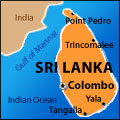Ilankai Tamil Sangam
Association of Tamils of Sri Lanka in the USA
Published by Sangam.org
The Process of Preventing a Diplomatic Settlement
by Fr. Chandi Sinnathurai, DissidentVoice.org, March 20, 2007
|
The worrying pattern is that, as the Amnesty International statement suggests, they have no protection from either side. If you happen to be a young Tamil aged anywhere between 16 and 35 you could be a prime-suspect for arrest or killing as a “Tamil Tiger.”
|
Hundreds of thousands of indigenous Tamils from both the East and the North in Sri Lanka are fleeing to relative safety from the indiscriminate air attacks and multi-barrel rocket launchers from the Sri Lankan Armed Forces even as I write. A public statement released on 9 March by the Amnesty International reported:
Many civilians are caught up in the fighting between the Government of Sri Lanka and the Liberation Tigers of Tamil Eelam and urgently require effective protection. More than 220,000 civilians have been displaced by the violence. Amnesty International is concerned that the parties to the conflict are not doing all they can to protect the civilian population.
 Today media reports from the capital Colombo draw an even bleaker picture. It is estimated that over 150,000 people have evacuated themselves from Tamil territory in the East (Batticaloa District) owing to the continued indiscriminate shelling from the state forces for the last three days.
Today media reports from the capital Colombo draw an even bleaker picture. It is estimated that over 150,000 people have evacuated themselves from Tamil territory in the East (Batticaloa District) owing to the continued indiscriminate shelling from the state forces for the last three days.
At the end of the day, it is the civilian population -- especially the poor and the vulnerable, women and children, who find themselves sheltering under trees, in open spaces or in churches and in schools as “internal refugees” struggling for food and clothing without any proper social welfare services. The worrying pattern is that, as the Amnesty International statement suggests, they have no protection from either side. If you happen to be a young Tamil aged anywhere between 16 and 35 you could be a prime-suspect for arrest or killing as a “Tamil Tiger.”
In the heat of the battle, there are calls from various quarters for international intervention with the hope of kick-starting the defunct peace process.
The five-year old Oslo inspired Ceasefire Agreement (CFA) is dead and buried. In fact, the CFA was lamentably only a cosmetic exercise. It was during the CFA that the Sri Lankan state engaged in a so-called “Shadow war” against leading Tamil citizens. The state systematically liquidated most, if not all, credible and articulate voices among the Tamils: legislators, intellectuals, writers and journalists, including human rights activists and humanitarian workers, were abducted and murdered.
In the Sri Lankan conflict both the systematic silencing of dissenting voices and the use of human shields of innocent civilians have been the primary crimes. When confronted, parties to conflict have taken cover in plausible deniability. The worst crime of all is that the international community has shown little interest in the crimes against humanity in Sri Lanka. Geo-political and other mercantile interests, including Western investments, have predominated.
It is believed that there will be no military solution to this conflict. However, the past five years of the Oslo peace process has been generally viewed with much cynicism. If there is to be a peace formula, there has to be a new peace-broker and it has to bring about a humane solution; putting people in the centre rather than other vested interests.
One would do well to remember the caveat of Noam Chomsky (speaking in 2006 on the plight of Palestine): “The process of preventing a diplomatic settlement has a name. It’s called the ‘peace process.’”
Fr. Chandi Sinnathurai is a Christian priest. He has written extensively on the Sri Lankan conflict.
© 1996-2025 Ilankai Tamil Sangam, USA, Inc.
 Today media reports from the capital Colombo draw an even bleaker picture. It is estimated that over 150,000 people have evacuated themselves from Tamil territory in the East (Batticaloa District) owing to the continued indiscriminate shelling from the state forces for the last three days.
Today media reports from the capital Colombo draw an even bleaker picture. It is estimated that over 150,000 people have evacuated themselves from Tamil territory in the East (Batticaloa District) owing to the continued indiscriminate shelling from the state forces for the last three days.